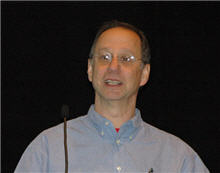Defrag: Deconstructing the social Web


He points to links as the way to reconnect the pieces more naturally. "The Web is different. It's about links and in that sense links are the opposite of information. Links enrich and are decentralized, personal, messy and most of all fully social," Weinberger said. This idea is linked to the unspoken, the implicit by virtue of the language between humans, from sentences, paragraphs and punctuation to links, which point beyond the self and point to the "lumpiness" of the unsaid.
"Making content public were founding events in our culture, once in writing and then printing. Now we can make relationships among ideas and content permanent and public through links," Weinberger said. "It is the rejoining of the world, not just information. We are writing together our world. Links are gestures to what matters to us, what is between us."
As you might have guessed, the Defrag conference is not the usual technology-related conference. It's about ideas, philosophy and even poetry, not products and services--more like a university colloquium on the social and anthropological impact of the emerging social and semantic Web within organizations. It's not even clear what the overall themes are for this inaugural event...other than to flesh out the themes.
"Defrag is about the space that lives in between knowledge management, 'social' networking, collaboration and business intelligence," according to the show program. Topics include 'defragging' identity, attention, Enterprise 2.0, vendor relationship management, semantic Web and collective intelligence.
The second act was a panel (below) on "social intelligence" with J.B. Holston, CEO of NewsGator; JP Rangaswami, managing director of design at BT; Joshua Schachter, founder of del.ici.ous (owned by Yahoo) and moderator Jerry Michalski.
Social intelligence is tied to the deepening social layer of the Web and a new generation of users who are digital natives. Rangaswami point to a simple example of how social software is changing the way people work. "In any product or technology service company, people spend time creating presentations and then have to lug them around. I can't see why you can't use YouTube and tags to share a presentation. We were scared of doing it for some intellectual property, but the youth of today are more comfortable and can generate ideas. They don't need a crappy way of enshrining ideas from the past."
"The tools are better better faster than the information is getting better," he added. Schachter countered that the tools are getting better but are not great.
From the audience, Christopher Locke commented, "Social intelligence is not something you can put in box and say it is a good commodity. There is a lot of ideology and assumption that breaks down. There isn't one community making these."
Schachter responded, "Intelligence is not just knowledge, it's also about decision making. These two legs, decision making and knowledge, are important and semi-separate. I would agree that consensus is almost impossible to achieve. It's amazing that Wikipedia works. It inordinately painful, and under every page is a flame war. It doesn't seem like a scalable system. In del.ici.ous everyone one gets an opinion."
It turns out that the kind of social intelligence evolving in the digital world will mirror what happens in the 'real' world. "We'll see things brought out of the network that you didn't even know existed and they won't be owned by any individual," Ranagswami said. And, as Weinberger noted, it will be messy, lumpy, decentralized and inherently social.
Check out my interview with Rangaswami about his use of social tools at BT.